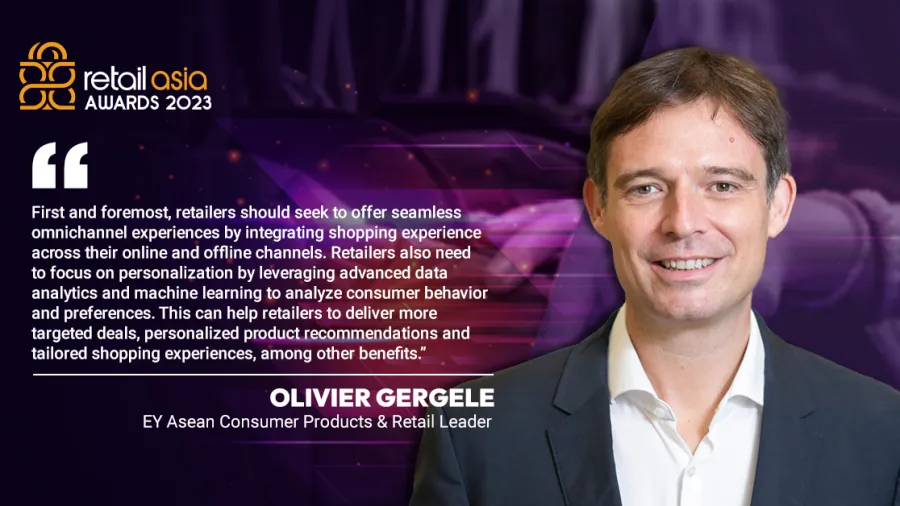
Social commerce growth expected to triple vs e-commerce, says EY leader
This comes amidst the accessibility and popularity of social media usage amongst younger generations.
Olivier Gergele is the EY Asean Consumer Products & Retail Leader based in Singapore, where he has vast operational and consulting experiences in the consumer products and retail sectors globally and across Southeast Asia.
He assists clients in their engagements such as strategy development, operating model and organisation review, go-to-market definition, value creation, and large-scale commercial and cost transformation programmes.
Gergele’s experience covers projects on growth strategies, innovation, value creation, go-to-market, sales and marketing effectiveness, profitability improvement, cost and complexity reduction, change management and large-scale transformation.
In his outlook for the retail industry in 2023, one of the key trends he highlighted is how social commerce, popular amongst tech-savvy millennials and Gen Zs, is expected to grow three times as fast as traditional e-commerce, more than doubling from US$492b worldwide in 2021 to US$1.2t in 2025.
This comes amidst the accessibility and popularity of social media usage, wherein applications are now becoming virtual stores.
“Retailers and brands can capitalise on this opportunity by creating new consumer journeys, increasing brand visibility through influencer marketing and tapping into live streaming,” Gergele said.
The EY leader sat down with Retail Asia to discuss how retailers can drive growth amidst uncertainties in the market, promoting sustainability programmes in retail, as well as how retailers can take their digital transformation roadmaps further.
Amidst threats of global inflation and tightening monetary policies, how do you think retailers can drive growth? What strategies can they leverage?
Against the current economic backdrop, retailers need to tailor their strategy based on their target consumer base. For example, retailers targeting value-conscious consumers can provide higher value to their consumers in this inflationary environment by optimising assortment toward larger pack sizes whilst reducing costs via supply chain and logistics optimisation. Retailers can also benefit by investing in their private label brands, ensuring affordability and quality to their consumers whilst establishing themselves as trusted providers of value-for-money options and improving profit margins.
On the other hand, price-insensitive consumers will be less affected by global inflation and tightening monetary policies as their willingness to pay remains relatively unaffected. Retailers targeting such consumers need to double down on providing unique experiences and personalisation for their consumers through harnessing data, whilst turbocharging investments in new channels to provide seamless omnichannel shopping experiences.
One of the main highlights of the retail industry in recent times is the integration of digital transformation initiatives of retailers in their operations. How do you think they can take their digital innovations further? Are there technologies they can utilise
First and foremost, retailers should seek to offer seamless omnichannel experiences by integrating shopping experiences across their online and offline channels. Retailers also need to focus on personalisation by leveraging advanced data analytics and machine learning to analyse consumer behaviour and preferences. This can help retailers to deliver more targeted deals, personalised product recommendations and tailored shopping experiences, amongst other benefits.
Another key strategy is to embrace emerging technologies such as artificial intelligence (AI), augmented reality (AR) and virtual reality (VR) to enhance the consumer’s shopping and brand interaction experience. Some examples include AI-powered chatbots, AR and VR for immersive shopping experiences, and self-checkout options, amongst other innovations. Finally, retailers can explore the use of robots and automation in retail, including autonomous delivery and service options, and robotic inventory management through radio-frequency identification (RFID) technology, to improve efficiency and enhance the overall shopping experience.
By adopting these strategies, retailers can stay ahead of the curve in an increasingly digital retail landscape.
As many industries begin to employ ESG and sustainability programmes, how do you think the Asian retail sector can promote these?
Today, more and more consumers are adopting a “planet first” mentality. The 11th wave of the EY Future Consumer Index found that more than half of those surveyed were more willing to pay more for products if they are produced more sustainably. With this, retailers in Asia can seek to heighten public awareness of their environmental, social and governance (ESG) programmes by signalling a strong commitment to sustainability throughout the entire value chain.
Retailers can build transparent and sustainable supply chains from procurement to delivery, by collaborating with sustainable suppliers, implementing sustainable sourcing practices and decarbonisation initiatives, and reducing wastage. Another important strategy is to incorporate sustainable products, such as eco-friendly packaging, recycled materials and organic products, which will demonstrate a commitment to sustainability and send a positive message to consumers. Finally, retailers can explore consumer education, providing sustainability-related information on product labelling via in-store signages, social media campaigns and sustainability events. An important element across all these is employees; hence employee training to help them better appreciate the organisation’s ESG commitment and goals is key.
By promoting ESG and sustainability programmes, retailers in Asia can remain relevant to consumers and contribute to a more sustainable future.
What trends should retailers watch out for this 2023? How can they leverage these trends?
Social commerce, popular amongst tech-savvy millennials and Gen Zs, is expected to grow three times as fast as traditional e-commerce, more than doubling from US$492b worldwide in 2021 to US$1.2t in 2025. Retailers and brands can capitalise on this opportunity by creating new consumer journeys, increasing brand visibility through influencer marketing and tapping into live streaming.
In addition, retailers can enhance experiential retail by incorporating virtual experiences such as VR, AR and interactive kiosks and offering mixed-use retail experiences that incorporate food and beverages spaces in fashion stores. Some retailers are tapping into emerging technologies like the metaverse to create immersive shopping experiences via 3D virtual stores, virtual try-ons and interactive games.
Further, flexible payment options such as Buy Now, Pay Later schemes are also gaining popularity and retailers can explore partnerships with banks and fintech companies to offer these options to consumers. Finally, automation can be used for inventory and manpower management, helping retailers to increase efficiency and reduce costs at the same time.
Being a judge again in this year’s awards programme, what are the key qualities or innovations that will stand out to you?
As the retail sector continues to evolve, there are several key qualities that will be essential for retailers to succeed.
Firstly, a consumer-centric approach will be a major differentiating factor. Retailers that prioritise their consumers' needs and preferences will be able to build strong and loyal consumer relationships. Secondly, brand differentiation and a unique proposition will be critical for retailers to stand out from the competition. Successful retailers can differentiate themselves through unique and memorable branding, storytelling and marketing strategies, showcasing their creativity and strategic thinking. Thirdly, technological innovation will be essential for growth opportunities across offline and online channels. Retailers that harness technology to create delightful consumer experiences and identify cost and productivity improvements across different operations will be well-positioned to succeed. Finally, sustainability and ESG initiatives will be increasingly important with changing consumer preferences. Retailers that look for opportunities to incorporate sustainability and ESG initiatives throughout their entire value chain will be able to demonstrate their commitment to creating a better future for all stakeholders.



















 Advertise
Advertise






